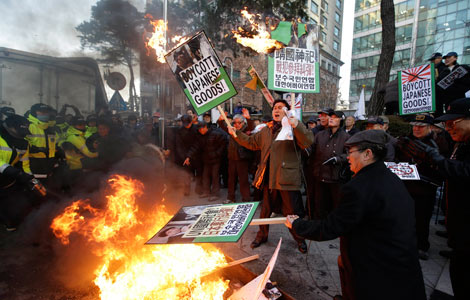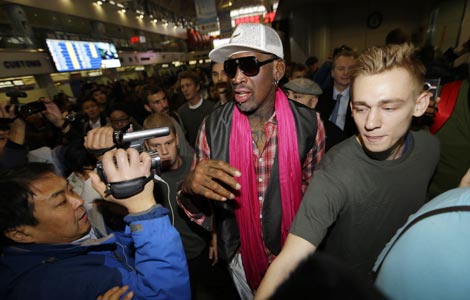In search of genuine intellectuals
Updated: 2014-01-08 07:22
By Zhu Yuan (China Daily)
|
||||||||

Intellectuals and Society by Thomas Sowell, translated into Chinese and published in August 2013, provides some insight into the verifiability of ideas. To be precise, the book talks about how ideas of some intellectuals in the West have had a negative impact on society. Although Sowell talks about intellectuals in the West, the role that intellectuals play in China is as important as that in the West.
Intellectuals were held in great esteem in China because they comprised a fraction of the population and because of the examples they set in moral and social mores until they were berated as being inferior to farmers and workers from the 1950s to 1970s, which necessitated the transformation of their outlook from the bourgeois to the proletarian.
Fortunately, this period did not last long, and intellectuals reoccupied their superior social status after 1978, known as the "spring for knowledge". Respect for knowledge became a slogan that revived the traditional respect for intellectuals and the ideas they provided.
But the connotation of intellectuals in China has changed over the past couple of decades because of the rapid increase in the number of people with higher education and the widespread use of the Internet along with blogs, micro blogs and WeChat, which have prompted almost all, however knowledgeable or intelligent they may be, to share their ideas with others.
If a university graduate can be called an intellectual, the country is churning out 6-7 million intellectuals every year. With so many intellectuals rolling out in batches from what could be called an assembly line, it is not possible for them to command the same respect as their predecessors.
As a result, when the word intellectual is used nowadays, the demarcation line is blurred between its reference to educated people per se and thinkers or opinion leaders.
As far as I know, the Chinese phrase zhishi fenzi, a literal equivalent of the English word "intellectual", is now often used to refer to educated people. If the concept is used in its traditional sense, a modifier is needed before the word intellectual. For example, we may call a person a "real intellectual" for his special insight into some problems or social issues, or "intellectual with a conscience" for the sympathy he or she displays for the disadvantaged or his or her insightful discourse on a problem.
Perhaps this change has prompted the frequent use of the term zhuanjia (experts) to refer to some opinion leaders or those who often voice their opinions on big issues on the Internet or in the print media. Such a term is used not only to give prominence to their position or add value to what they say, but also to distinguish them from the vast number of Internet users who also often express their views on current issues.

 Pollution's effect on health not clear yet, officials say
Pollution's effect on health not clear yet, officials say
 Russia imposes security clampdown in Sochi before Olympics
Russia imposes security clampdown in Sochi before Olympics
 X-ray reveals crying toddler had 5-cm needle inserted in his lung
X-ray reveals crying toddler had 5-cm needle inserted in his lung
 Tokyo urged to end militarism
Tokyo urged to end militarism
 Military drill in SW China
Military drill in SW China
 Rodman in DPRK with ex-NBA team
Rodman in DPRK with ex-NBA team
 Merkel breaks pelvis
Merkel breaks pelvis
 Trick photography
Trick photography
Most Viewed
Editor's Picks

|

|

|

|

|

|
Today's Top News
Staying ahead of the game
Odierno: US, China to work on issues
China is importing more US-built cars
Reform plan faces `challenges’: Professor
US jobless bill clears Senate hurdle
Solar firms face 'total eclipse' in US
Hong Kong Media mogul Shaw dies
Tokyo urged to end militarism
US Weekly

|

|







